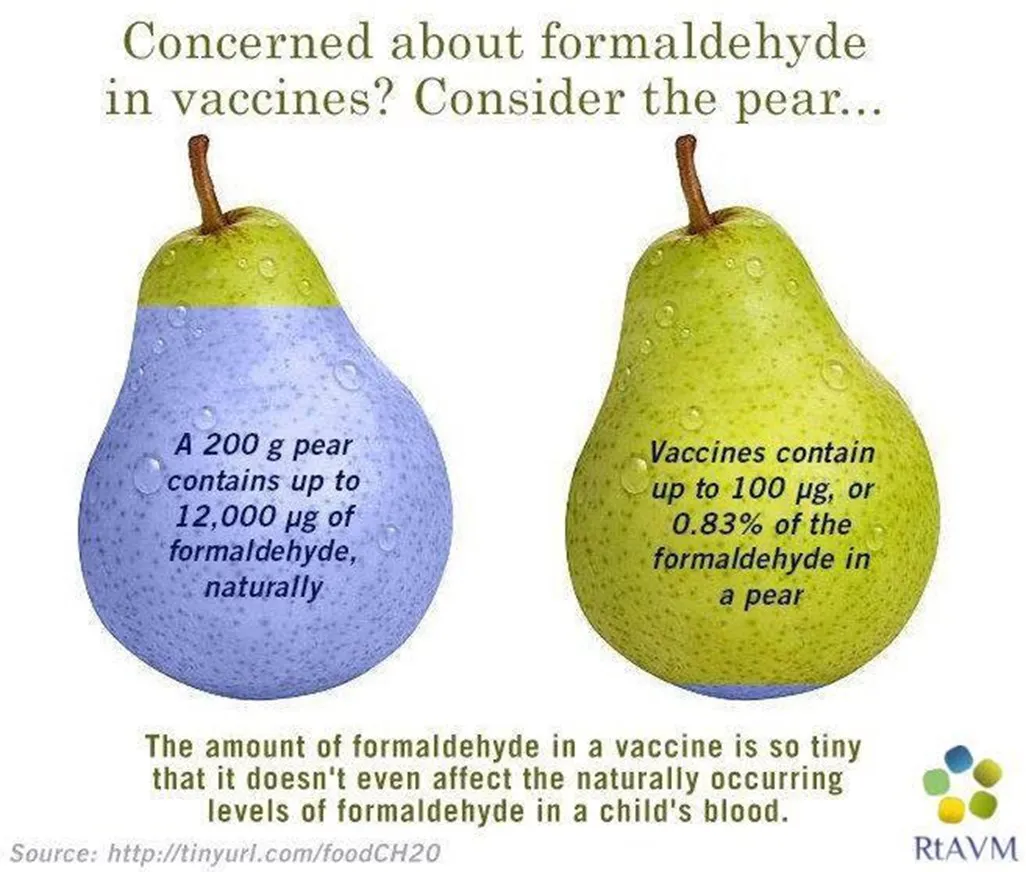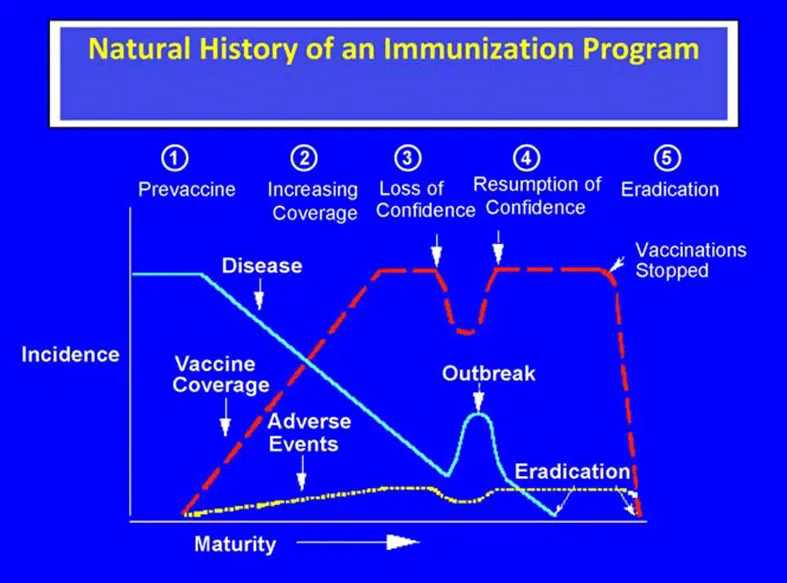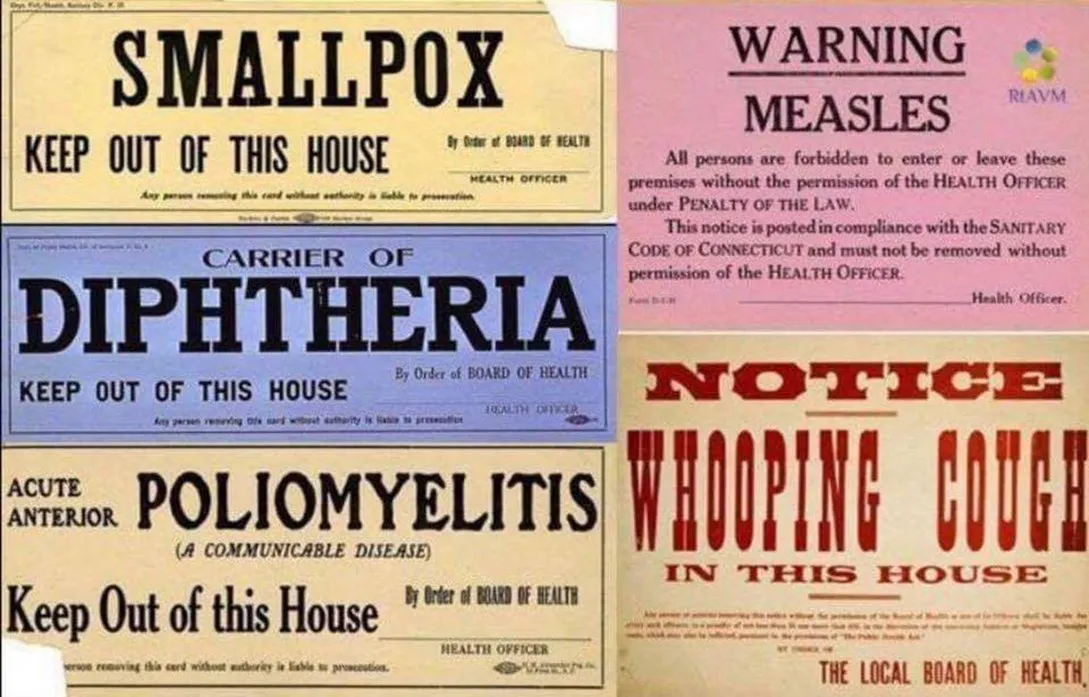Vaccine misconceptions
Craig Shearer - 1st November 2019
This is a part of a talk Craig presented at the No Barriers Conference at Great Barrier Island in September 2019
I’d like to run through a few claims that anti-vaxxers make and explain errors and fallacies behind them.
Vaccines contain toxic substances such as aluminium, mercury, and formaldehyde.
A large component of this fear and misconception is chemophobia – the fear of scary sounding chemicals, and a lack of appreciation that it is the dose that makes the poison. Many things we encounter on a daily basis are toxic in the right quantities, even water. Aluminium is a very common element, making up about 8% of the earth’s crust and we typically breathe, eat or drink about 30 – 50mg of it every day – 20 times the maximum allowed in a vaccine dose.
Mercury is found in high levels in long-lived fish such as Tuna, in the form of methylmercury – and is highly toxic and accumulates in the body. That’s why we should be careful with the amount of certain species of fish we consume. But, in vaccines, there was a preservative agent called Thimerisol, (or Thiomersal in NZ), which contained ethylmercury – a completely different form from methylmercury. Ethylmercury doesn’t accumulate in the body and is eliminated from the body quickly. For comparison, a dose of vaccine contains about the same amount of the element Mercury as an 85g can of Tuna.
Formaldehyde is another scary sounding chemical – it’s what embalmers use to preserve human bodies after death. But it’s a naturally occurring substance. A baby’s blood contains between 12 and 240 times more formaldehyde than is contained in a single vaccine shot. It’s also found in pears – a vaccine shot contains less than 1% of the formaldehyde in a single pear!

Too many vaccines overwhelm the immune system
The slogan from the anti-vaxxers is “Too many too soon”. The claim is that vaccines overwhelm the immune system, weakening it, and causing sickness. In reality, the challenge to the immune system from vaccinations pales in comparison to the daily challenges everybody experiences from just living life. Our bodies are constantly exposed to invaders and our immune system does a good job of dealing with them.
Vaccines have dangerous side effects
There are wild claims of vaccine injury that people make. Linking vaccination with autism is a classic case of this. Vaccinations are given to babies around the time that developmental disorders are beginning to show up. To claim that the vaccines cause autism is mistaking correlation for causation, or as it’s formally known, the Post hoc ergo propter hoc fallacy.
The only way we can know whether something causes something else is to do studies, comparing the rates of the effects on those given the treatment vs those not given the treatment. We compare the background rate of incidence with the rate of those given the treatment. Many studies have been done and have concluded that vaccines aren’t to blame.
One example of this was with the HPV vaccine Gardasil. When it was first released, it was initially given to teenage girls to prevent cervical cancer. Here in New Zealand, a teenage girl sadly died after receiving the vaccine. Naturally, the mother blamed the vaccine. But, a study of the rate at which teenage girls suddenly and inexplicably die showed that the rates between groups receiving Gardasil and those not receiving it were no different. It was a very sad case, but the vaccine wasn’t the cause.
The reality is that vaccines are shown to be safe, and they go through a vast array of testing before being deployed to the public. There are side-effects but most are very minor such as soreness and bruising around the site of the injection. There are cases of serious side-effects, such as seizures, but these are extremely rare.
What’s not appreciated is that the risks from diseases from not vaccinating vastly outweigh the risks of the vaccines themselves.
The diseases aren’t that serious
Anti-vaxxers claim that the diseases that vaccines prevent aren’t that serious anyway and are just a natural part of childhood with minor effects. They claim that these diseases weren’t that serious in a bygone error. I beg to differ – people treated them very seriously!
And, this really isn’t true – as we’ve seen from the gory pictures earlier, these diseases are nothing to laugh about. What is true is that most people affected by a disease will get over it without any lasting consequences, but there will be others that do have serious consequences of it. Human memory is typically rose-tinted, and we often forget evils of disease from the past.
This graph is pretty telling about how vaccines work.

Before vaccines the disease is rampant. When a vaccine is developed, people have typically been very keen to get vaccinated – such was the case with Smallpox. As the vaccine coverage increases, we see a typical rise in adverse events – bad side effects of the vaccine – and that’s a consequence of the numbers involved, but as we’ve seen the percentages are tiny (1 in a million, to 1 in 10 million).
When the prevalence of the disease is low enough, or people latch on to anti-vax information, we se the vaccination rates drop – that’s we we’re at now with measles. And hopefully we’ll see vaccination resume after the outbreak, resulting in the disease prevalence reducing again.
At some point we call the disease eradicated, and for certain diseases that can only exist in human populations, smallpox being a good example, the vaccinations can be stopped, thus reducing the adverse events to zero.
“Big Pharma” is only in it for the money – conspiracy theories
Anti-vaxxers claim that the pharmaceutical industry pushes vaccines to make money, or that they know that vaccines aren’t safe but sell them anyway.

Firstly, vaccines make up only about 2-3% of the revenue of the pharmaceutical industry – hardly a huge money spinner. The alternative medicine industry makes much more money than the pharmaceutical industry makes from vaccines.
But, the major point of this is how unbelievable the claim actually is. When you think about what would be involved it would include the following aspects:
The pharmaceutical companies know that vaccines are dangerous (or don’t work) and purposely make them that way to make people sick in the future so they can sell more products.
They pay doctors and the media to push vaccines on people knowing that they’re dangerous.
They pay a vast array of scientists including those in government and independent organisations like the WHO and the CDC and the Ministry of Health.
That all companies are in collusion, knowing that vaccines are dangerous (or don’t work).
That all the studies have somehow been bought, or that all the studies that show that vaccines are dangerous or don’t work have been suppressed.
That everybody is either in on the scheme or is fooled by the big pharma propaganda.
They even pay people like me to lie for them, or I’ve been fooled.
That the anti-vaxxers are the only people smart enough to see through it and figure it all out and are out to warn the world.
Is this plausible? I think not. Vast conspiracies just don’t hold up, and this assumes a level of control and evil beyond imagination. But the thing we find with arguing with conspiracy theorists is that any evidence to the contrary is evidence for the conspiracy. If I say that I’m not being paid by Big Pharma, they’ll say that that’s what I would say.

A child from Bangladesh with smallpox
And they go on
The list of arguments by anti-vaxxers against vaccines is seemingly endless. Once one argument has been refuted, they quickly jump to other claims.
It seems that the arguments are red herrings. It’s not about the vaccines themselves, but the values they hold dear. Anti-vaxxers seem to hold two basic values – one of purity – that vaccines are dangerous drugs that poison the body, and liberty, that the government shouldn’t be telling them what to do.
If you’re an anti-vaxxer, the one argument I could make for purity is that vaccination prepares the body to combat diseases using nothing more than its own immune system, a completely natural process. Using a vaccine is way lower risk than exposing your child to the actual disease. Should the child then be exposed to the disease, they will be naturally protected and won’t risk having to be treated with pharmaceutical drugs.
From a liberty perspective vaccination is an act of protecting one’s own health and reducing or eliminating reliance on invasive procedures and drugs from the healthcare system. The government can’t protect you as well as your own well-prepared immune system.
At the end of the day, anti-vaxxers have put a lot of guilt onto parents. By making the association between vaccination and autism or other injury, it’s blaming the parents for vaccinating their child – inducing wrongly attributed guilt. What a weight must be lifted off to know that a child with autism is likely the result of genetics and environmental factors, and not something that the parents did.
Oh, and as an aside, blaming vaccines for autism further stigmatises people who are neurologically diverse.
Social responsibility
As we all know, we’re in the middle of a huge measles outbreak in New Zealand, and worldwide. As I was preparing this talk, I had to keep updating the numbers, as they kept growing – unfortunately, we’re close to one thousand measles cases, with the vast majority of those being unvaccinated kids.
It’s clogging up our healthcare system and costing a lot of money to handle these cases. And measles as we know, is vaccine preventable. What we’re seeing now is the result of vaccine denial.
Being part of a community means playing your part and doing your bit to protect others from harm. By vaccinating you’re not only protecting yourself and your children from serious diseases but helping keep diseases at bay by preventing their spread. Not vaccinating is pretty selfish, especially when you’re putting those that can’t be vaccinated at risk.
The way ahead
In an ideal world, we’d have trust in our healthcare system and the advice of experts. Unfortunately, we seem to be far from this ideal outcome.
I’d advise people to look for trusted sources of information online. There are plenty of good sites that have evidence -based information about vaccines. You generally won’t find these on YouTube or Facebook or Instagram. And we should trust our medical professionals, who’ve spent years studying and know a lot more than the “research” that is typical of anti-vaxxers.
As we’re seeing with the current measles outbreak, it seems that these vaccine preventable diseases have to return before people realise the importance of vaccination. We’re likely to lose our herd immunity and that means that many more people are likely to get sick – people who were previously protected by others’ vaccinations.
Given the statistics it seems likely that people are going to die or have serious lifelong complications from this. We should all be saddened and disgusted by this outcome.